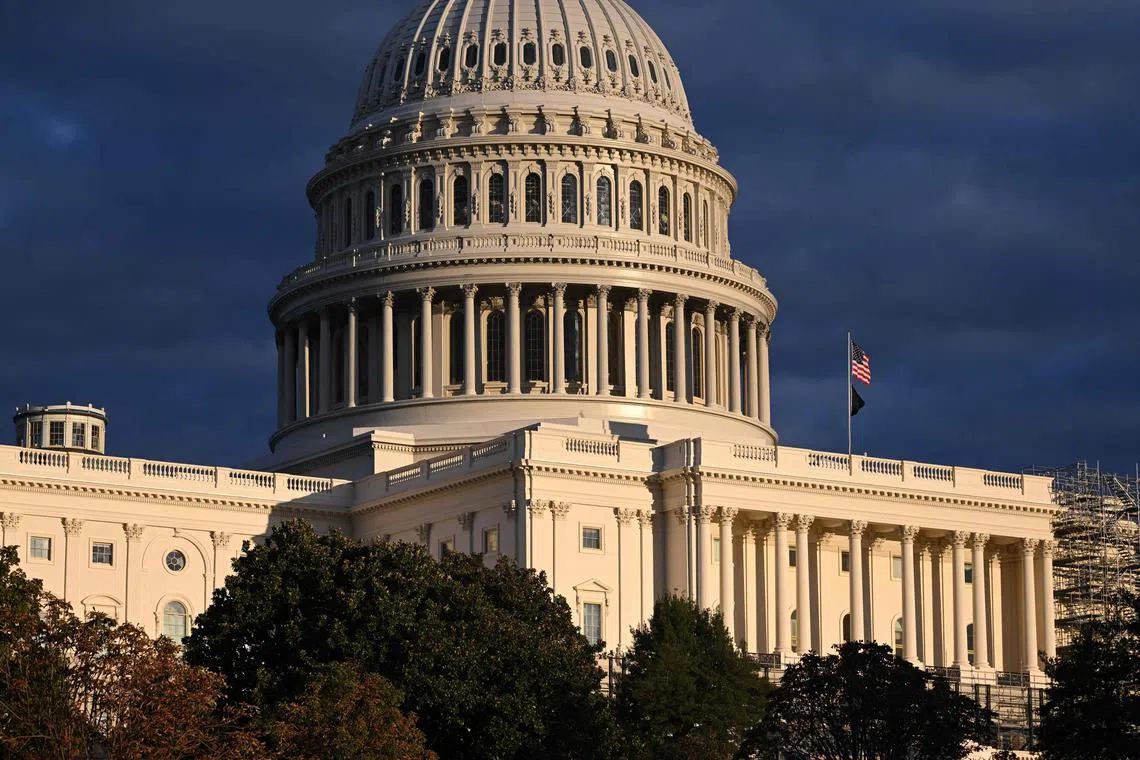What the House can do with no Speaker and how it affects the US
Sign up now: Get ST's newsletters delivered to your inbox

Until a new speaker is chosen, the House likely cannot conduct votes on legislation like pending fiscal 2024 spending Bills.
PHOTO: AFP
WASHINGTON – The conservative revolt that brought down the Republican leader of the House of Representatives has left the Lower Chamber of the US Congress in a state of paralysis.
With the government due to run out of funding again on Nov 18, and major issues like support for Ukraine in flux, Republicans can accomplish little until they agree on a new Speaker.
1. What does the Speaker of the House do?
The Speaker of the House of Representatives is sanctified by the US Constitution, where it is the first position named, even before the presidency. The Speaker controls what Bills come to the House floor for a vote, giving the post a powerful gatekeeping role.
Another reason the Speaker is so important: Since the House is seen as the Chamber most directly in touch with the people, the Constitution vests it with the authority to originate all Bills that raise revenue. This means the House originates all spending Bills. The Speaker is also second in line to the White House, after the vice-president.
2. What happened to the last Speaker?
A small group of dissident far-right Republican lawmakers engineered the ouster of Mr Kevin McCarthy as Speaker
Because Republicans have such a slim House majority, losing the support of only eight of his 221 lawmakers was enough to make Mr McCarthy the first Speaker to be removed from his job. The effort was made possible because Mr McCarthy himself agreed to a change in rules allowing any single lawmaker to motion for a Speaker’s removal.
3. What were the dissidents angry about?
Mr McCarthy’s fate was sealed by hardliners frustrated with his bipartisan dealmaking, who say it undermined their desire to rein in federal budget deficits. In recent months, Mr McCarthy had struck a deal with President Joe Biden, a Democrat, to avert a US default and allowed the House to approve a temporary funding plan that stopped an Oct 1 government shutdown.
Congress passed none of the 12 appropriations Bills for 2024 before the fiscal year began on Oct 1, and the rebel Republicans say they are tired of passing continuing resolutions – which keep spending at current levels – or massive, unamendable omnibus spending Bills in lieu of the 12 separate pieces of appropriations legislation.
4. Who might be the next Speaker?
Mr Jim Jordan of Ohio, the House Judiciary Committee chairman, is the second and latest Republican Speaker-designate. An ally of former president Donald Trump, he won the backing of 152 Republican House members in closed-door voting on Oct 13.
That is short of the 217 votes needed to be elected in a party-line vote on the House floor, where Democrats are expected to stick to voting for their leader, Mr Hakeem Jeffries of New York.
However, Mr Jordan has since picked up more public endorsements. Mr Steve Scalise of Louisiana, who held the No. 2 leadership post under Mr McCarthy, was the party’s first pick, but he dropped out on Oct 12 after determining he could not reach the 217 votes needed.
5. Who is in charge for now?
Mr Patrick McHenry, Republican of North Carolina, is now the Speaker pro-tem. Under the rules, he is limited in his powers and likely unable to conduct any normal legislative business.
His primary task is to organise the election of a new Speaker. If an impasse over choosing someone for that position ensues, the House could grant Mr McHenry time-limited authority to preside over debate and votes on ordinary Bills. That, however, would take a majority vote.
6. What can the House do without a Speaker?
Until a new Speaker is chosen, the House likely cannot conduct votes on legislation, like pending fiscal 2024 spending Bills. The rules have not been tested but the House rules-keeper is not expected to grant Mr McHenry full Speaker powers based on the limited role of the Speaker pro-tem. However, House committees can conduct business. Bloomberg


